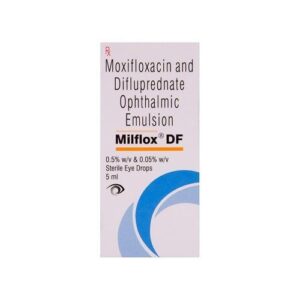BENZALKONIUM + MOXIFLOXACIN + DIFLUPREDNATE
Benzalkonium: Benzalkonium is a medication belonging to the class of drugs called quaternary ammonium compounds. It is primarily used as a preservative in various healthcare products such as eye drops, nasal sprays, and disinfectants.
The main mechanism of action of Benzalkonium is its ability to disrupt the cell membranes of microorganisms, leading to their destruction. It achieves this by interfering with the lipid bilayer of the cells, which is essential for their survival and normal functioning.
Dosage and administration of Benzalkonium depend on the specific product in which it is used. It is typically added in a low concentration to ensure effective preservation without causing adverse effects on the body. The exact dosage should be followed as recommended by the healthcare professional or as indicated on the product labeling.
Despite its beneficial properties, Benzalkonium can cause some side effects. These include irritation or stinging sensations in the eyes or nose when used in eye drops or nasal sprays. In some cases, it may cause allergic reactions, characterized by swelling, rash, or itching. Prolonged or excessive use of products containing Benzalkonium can also lead to dryness or irritation of the affected area.
It is important to note that Benzalkonium is not intended for internal consumption and should only be used externally as directed by a healthcare professional or as indicated on the product labeling.
Moxifloxacin: Moxifloxacin is an antibiotic drug that is used to treat various bacterial infections. It belongs to the fluoroquinolone class of antibiotics and works by inhibiting the DNA gyrase enzyme, which is essential for bacterial DNA replication and repair.
This drug is commonly prescribed for the treatment of respiratory tract infections, including community-acquired pneumonia, acute bacterial sinusitis, and chronic bronchitis. It may also be used for skin and soft tissue infections, as well as for certain urinary tract infections.
The recommended dose of moxifloxacin varies depending on the type and severity of the infection being treated. For respiratory tract infections, the standard adult dose is usually 400 mg once daily for a duration of 5 to 10 days. However, it is important to follow the specific instructions provided by the prescribing doctor, as the dose may be adjusted based on individual patient factors.
As with any medication, moxifloxacin may cause certain side effects. Common side effects include nausea, diarrhea, headache, dizziness, and insomnia. Less frequently, it may cause more serious adverse reactions such as tendon rupture, peripheral neuropathy, or allergic reactions. It is important to inform a healthcare provider if any side effects occur, particularly if they are severe or persistent.
Moxifloxacin should be used with caution in individuals with a history of certain medical conditions, including liver or kidney disease, seizures, or myasthenia gravis. Additionally, it may interact with other medications, so it is important to inform the doctor about any other drugs being taken.
Overall, moxifloxacin is an effective antibiotic that is used to treat a range of bacterial infections. However, it is important to follow the prescribed dose and report any side effects to a healthcare professional.
Difluprednate: Difluprednate is a corticosteroid medication used primarily for the treatment of ocular inflammation and pain following ocular surgery. It is available in the form of an ophthalmic emulsion.
The mechanism of action of difluprednate involves the inhibition of inflammatory cell infiltration, reduction of edema and fibrin deposition, and suppression of vascular permeability. It acts by binding to corticosteroid receptors and regulating gene expression, leading to the inhibition of various inflammatory mediators.
For post-operative ocular inflammation, the recommended dose of difluprednate is one drop applied to the affected eye(s) four times daily starting 24 hours after surgery and continuing for 2 weeks. The dosage may be gradually reduced over time as directed by the prescribing physician.
As with any medication, difluprednate can cause side effects. Commonly reported side effects include increased intraocular pressure (which can lead to glaucoma), blurred vision, eye pain or discharge, dry eyes, foreign body sensation, and sensitivity to light. Rare but serious side effects can include eye infections, cataracts, and corneal thinning or perforation. It is important to note that these side effects are more likely to occur with long-term use or if the medication is not used as directed.
It is crucial to consult with a healthcare professional before starting this medication, as they can provide personalized advice, assess potential drug interactions, and monitor for any adverse effects.

